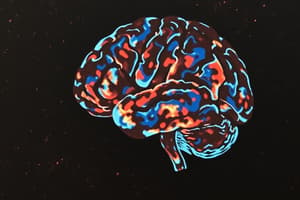Podcast
Questions and Answers
What primary focus do social psychologists have in relation to human behavior?
What primary focus do social psychologists have in relation to human behavior?
- Researching the physical abilities of athletes
- Studying the psychological impacts of chronic illnesses
- Understanding how social influence affects choices and behaviors (correct)
- Evaluating healthcare programs for effectiveness
Which of the following career paths is least likely for a social psychologist?
Which of the following career paths is least likely for a social psychologist?
- Evaluating educational programs for intervention strategies
- Providing therapy for chronic illness patients (correct)
- Offering advice for conflict mediation in organizations
- Conducting research in social psychology laboratories
How do sport and performance psychologists generally assist their clients?
How do sport and performance psychologists generally assist their clients?
- By developing physical training regimens for athletes
- By conducting nutritional assessments for athletes
- By diagnosing psychological disorders affecting performance
- By helping clients overcome psychological barriers to performance (correct)
In which settings are social psychologists most likely to work?
In which settings are social psychologists most likely to work?
What is a common role of sport and performance psychologists when working with athletes?
What is a common role of sport and performance psychologists when working with athletes?
Study Notes
Brain Science and Cognitive Psychology
- Brain scientists and cognitive psychologists study how the human mind thinks, remembers, and learns.
- They apply psychological science to understand how we make decisions and perceive our world.
- Research focuses on how people acquire, perceive, process, and store information, and how cognition and emotion interact.
- Magnetic Resonance Imaging (MRI) allows researchers to see brain activity, helping them understand how it reacts to stimuli and how differences in brain structure affect health, personality, and cognitive functioning.
- Cognitive psychologists work in clinical settings to treat issues related to human mental processes, such as Alzheimer's disease, speech issues, memory loss, and sensory or perception difficulties.
Climate and Environmental Psychology
- Climate and environmental psychologists use psychological science to improve human interactions with the environment.
- They study human responses to natural and technological hazards, and the influence of environments on loneliness and stress.
- Research questions include how mood changes with weather, why some people are committed recyclers, and how office space colors can improve productivity.
Clinical Psychology
- Clinical psychologists integrate the science of psychology with the treatment of complex human problems.
- They address a breadth of mental, emotional, and behavioral disorders, and work with specific populations like youth, families, and racial and ethnic groups.
- Clinical psychologists focus on prevention, assessment, diagnosis, and treatment of human problems, including short-term difficulties and chronic conditions.
Counseling Psychology
- Counseling psychologists facilitate personal and interpersonal functioning across the lifespan.
- They help people recognize their strengths and find resources to cope with everyday problems and adversity.
- Counseling psychologists focus on interactions between people and their environment, and on educational and career development.
Developmental Psychology
- Developmental psychologists study how people grow, develop, and adapt at different life stages.
- They apply research to help people overcome developmental challenges and reach their full potential.
- Research includes studying the differences between learning styles in babies and adults.
Experimental Psychology
- Experimental psychologists use science to explore the processes behind human and animal behavior.
- They create hypotheses and then set out to prove or disprove them through experimentation.
- Research covers a wide range of behavioral topics, including sensation, perception, attention, memory, cognition, and emotion.
Forensic and Public Service Psychology
- Forensic and public service psychologists use psychological science to support the judicial system and public safety.
- They conduct evaluations that inform and guide legal proceedings, and help select police officers and train first responders.
- Research includes assessing mental competence, youth testimony, and the impact of crime on victims.
Health Psychology
- Health psychologists use psychological science to promote health, prevent illness, and improve health care.
- They study how biological, social, and psychological factors influence health and illness.
- Research includes exploring how people make healthy choices and how to promote health promotion and illness prevention.
Human Factors and Engineering Psychology
- Human factors and engineering psychologists strive to make everyday experiences easier and more comfortable.
- They apply psychological science to the design of products, systems, and devices we use every day.
- Research focuses on performance and safety, and improving our interactions with technology.
Industrial and Organizational Psychology
- Industrial and organizational psychologists study and assess individual, group, and organizational dynamics in the workplace.
- They apply research to identify solutions to problems, improving the well-being and performance of organizations and their employees.
Educational Psychology
- Educational psychologists study how people learn and retain knowledge.
- They apply psychological science to improve the learning process and promote educational success for all students.
- Research includes identifying learning methods, understanding individual learning, and informing the instructional process.
Quantitative Psychology
- Quantitative psychologists study and develop methods and techniques to measure human behavior and other attributes.
- They use statistical and mathematical modeling to analyze psychological processes and design research studies.
- Research includes evaluating programs at the federal, state, and local government levels.
Rehabilitation Psychology
- Rehabilitation psychologists study and work with individuals with disabilities and chronic health conditions.
- They help individuals overcome challenges and improve their quality of life, focusing on factors like family support and treatment provider relationships.
Social Psychology
- Social psychologists study how social influence, social perception, and social interaction influence individual and group behavior.
- They use psychological science to understand how we perceive ourselves in relation to the world and how this affects our choices, behaviors, and beliefs.
- Research includes conducting studies on human behavior, evaluating educational programs, and searching for ways to encourage pro-social behavior.
Sport and Performance Psychology
- Sport and performance psychologists use science to study human behavior and abilities in sport, exercise, and performance.
- They help people overcome psychological barriers that can impede their achievements and professional success.
- Research focuses on identifying and applying psychological principles that facilitate peak sport performance, enhance physical ability, and achieve optimal human performance.
Studying That Suits You
Use AI to generate personalized quizzes and flashcards to suit your learning preferences.
Description
Understanding how the human mind thinks, remembers, and learns through psychological science and brain research.



